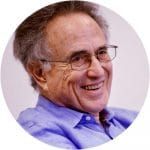Reliable, confirmable, universal, welcoming: Attributes of science that convey its power and uniqueness
By Robert Socolow, December 9, 2011
Randy Olson is right: “Superior” is a badly chosen word. Saying, as I did in Round Two, that science is a “superior way of knowing” contradicts my first-round essay, which argued that science is not just one of many belief systems, but a different way of knowing. To explain how science should not be defended, I invoked the scene on Mount Carmel staged by Elijah, where the God of the Jews sets a pile of wood on fire after Baal is unable to do so. I said: “Science is not just another point of view.”
I used the word “superior” just once, in the headline, and I lost Randy Olson in the process. I am surprised that he didn’t feel obliged to come up with alternative language. I hereby invite him and the other member of this roundtable, Roger Pielke, to join with me in this final round to identify forceful and productive — yet inoffensive — language that justifies giving priority to science in children’s education and in the processes of government. (Here I am assuming they agree that such priority is warranted.)
I have been collecting adjectives that others have used to describe what is different about science. Paul Nurse, now head of the Royal Society, wants students to be able to distinguish astronomy from astrology; he thinks the key is to show that science is “reliable.” Stewart Brand, founder of the Whole Earth Catalog, says science is “confirmable.” Spencer Weart, a historian of science, asserts that science is “universal,” in no way owned or controlled by any nation or sect. To this list let me add that science is “welcoming,” in the sense that it nourishes the counter-argument. “Reliable, confirmable, universal, and welcoming” is a good package that succinctly bundles what I wrote in Round One: “Science is a process of searching, always incomplete. Its norms include strict evidentiary standards and transparency. Anyone working anywhere can overturn a prior consensus.”
The case for the distinctiveness of science is treated skeptically by practitioners of “science studies,” a relatively new, cross-cutting research area found in many universities, but usually not in their natural science departments. The science studies researcher can be expected to assert that science is not universal to the extent that it is culturally determined; not welcoming to the extent that it imposes conformity; and not reliable or confirmable to the extent that it is the expression of self-interest. The problems we are facing today in our public discourse about science have some of their roots in an agreement to disagree, dating to nearly half a century ago, between those who believe there is an underlying reality that science accesses uniquely and those who see science as only one enterprise among many, all with feet of clay. Forthright dialogue between natural scientists and science studies researchers is overdue. Conceivably, it will lead to a level of mutual understanding sufficient to reduce the current level of discord regarding what science aspires to and has already achieved.
We were asked, at the beginning of all this: “What is the proper scientific response to the political distortion — or even outright rejection — of science?” Indeed, this is one of the most critical questions of our times. The stakes are very high; I warned that “an age of darkness could lie ahead.” The central task is to “retain — or perhaps regain — the public’s trust.” Science at its best is widely admired (I likened science to a palace). Friends of science who are not scientists can be especially helpful.
In pursuit of the goal of countering the rejection of science as a way of knowing, my principal recommendation is to put much more effort into communicating how science is done nearly all of the time — its norms and strategies. Thanks to the creativity and diligence of a generation of science communicators, the heroic accomplishments of science — from the structure of DNA to the mapping of black holes — are broadly appreciated. Arguably, however, these efforts have done little to reduce the alienation of large segments of the public from the scientific enterprise. Perhaps, if the communicators of science put comparable effort into explaining the processes that make science distinctive, a more profound and trusting relationship between the layperson and the professional will emerge.
Topics: Climate Change
Share: [addthis tool="addthis_inline_share_toolbox"]














